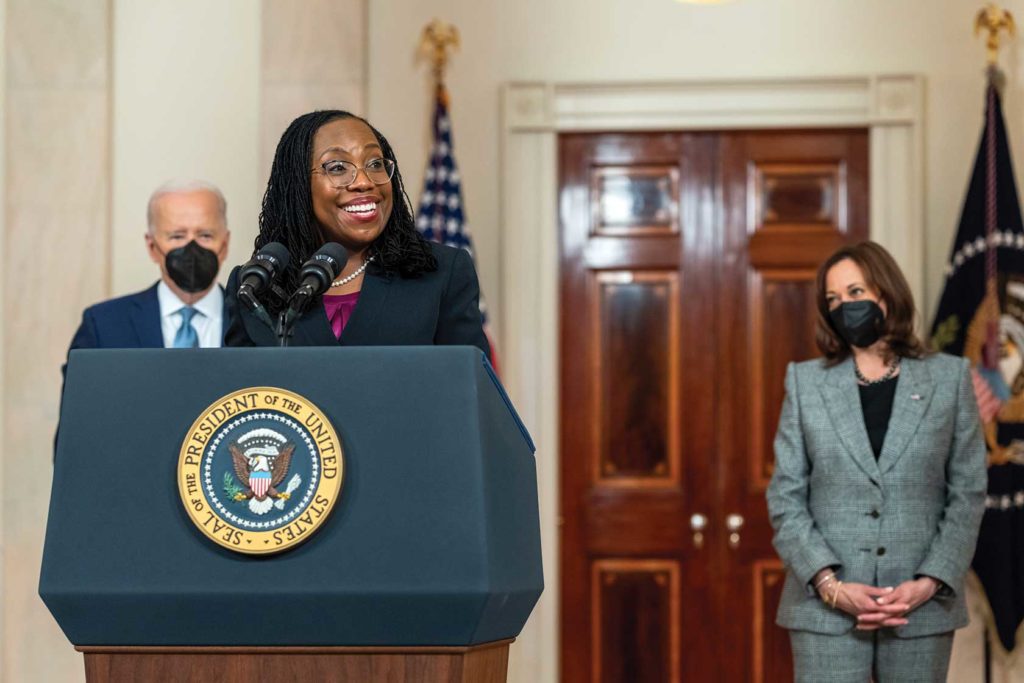Locals see progress in Jackson confirmation
Historic appointment bodes well for Black women in law

Last week, in a 53-47 vote, the U.S. Senate confirmed Judge Ketanji Brown Jackson to the United States Supreme Court, making her the first Black woman to ever serve as a Supreme Court justice.
As news of her confirmation spread, many women in law and government have applauded her achievement and reflected on the historic nature of the appointment.
“Judge Ketanji Brown Jackson is a supremely qualified nominee whose history-making confirmation today sends a powerful signal to Black girls everywhere that we belong in the halls of power and at every decision-making table,” Congresswoman Ayanna Pressley, who made history as the first Black woman elected to Boston’s city council in 2009, said in a statement.
“Judge Jackson is principled and committed to equal justice under the law, and I look forward to seeing her work toward a vision of justice that is inclusive, equitable, and centers the humanity of everyone who calls America home,” she added.
The 51-year-old Jackson is a Harvard graduate who served eight years as a federal trial court judge and most recently was confirmed to the U.S. Court of Appeals for the District of Columbia last June.
Some notable rulings include her 2019 decision in which she blocked the Trump administration’s attempt to shield former White House counsel Don McGahn from testifying before Congress. Additionally, she was responsible for sentencing the “Pizzagate” gunman back in 2017.
As a Court of Appeals judge, Jackson has worked on labor issues — supporting union calls for corporate transparency — and has also ruled on decisions surrounding the Trump administration’s involvement in the Jan. 6 incident.
Jackson, despite her qualifications, faced a grueling confirmation process, with senators becoming hostile at times in their questioning. Conservative lawmakers took the 23-hour process as an opportunity to grill the nominee on partisan issues.
“It’s hard to describe what I felt watching Justice Ketanji Brown Jackson’s confirmation hearings. The way some senators attacked and spoke down to her was all too familiar to me, and I know Black women in the workplace and our society know what I’m talking about,” said former city councilor Andrea Campbell, who is running for Massachusetts Attorney General.
“But the joy I felt once Judge Jackson was confirmed is indescribable,” Campbell continued, “because representation matters, and she will bring a perspective to the work that residents in this country have been waiting for, for generations. History made. Glass shattered. Representation, finally.”
In addition to her accolades as a judge, Jackson also stands out in her experience as a public defender. She is the first Supreme Court justice since Thurgood Marshall to have represented indigent criminal defendants — an experience that some say will be invaluable as she begins her work defending the constitution.
“That’s a wealth of knowledge and experience that her colleagues wouldn’t have had,” said Angela McConney Scheepers, an administrative magistrate and recipient of the 2021 Mass Black Attorneys Public Interest Award. “Her appointment fulfills the promise of America, which has been delayed for many people.”
Geraldine Hines, a former associate justice on the Massachusetts Supreme Judicial Court, echoed McConney Scheepers’ sentiment, while reflecting on her own experiences navigating a career in the law.
“I think that we need to understand that the law is not some blank slate that can be interpreted without regard to people’s life experiences. And so that’s why it’s so important to have diverse voices,” Hines said.
She added that Jackson’s confirmation is a remarkable achievement in the face of ongoing racism.
“Every Black person feels that they have to be twice as good as a white person, because your credentials are always going to be under scrutiny. Everything you do is going to be under scrutiny in a way that white people escape,” she said.
Tanisha Sullivan, president of the Boston Branch of the NAACP and a candidate for Massachusetts Secretary of State, also shared her own experience with racism and sexism and how that makes this achievement even more groundbreaking.
“I have been practicing law now for 20 years, and I am still told that I’m not qualified to do so many things,” she said. “I am certainly mindful of the historic nature of this appointment and the fact that it represents generations worth of struggle and fight and perseverance. I could not be more proud of the fact that we not only have a Black woman on the Supreme Court of the United States, but that she is someone who comes with so much depth of experience.”
All the women who spoke with the Banner regarding Jackson’s appointment agreed that they hope she can inspire future generations of Black female lawyers to someday serve on the bench.
“I just hope it’s not the last,” said Patrice Dixon, president of Massachusetts Black Women Attorneys. “Just like I came into this organization and was motivated and inspired to lead the person coming after me who joined the organization as a baby lawyer … hopefully they’ll be inspired to lead and take others with them.”
Judge Jackson will likely take her seat on the bench after Justice Stephen G. Breyer retires this summer, at the end of the current term.






